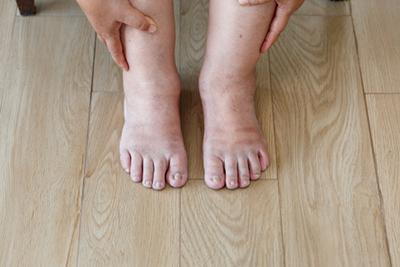Regular Foot Exams for People With Diabetes: What To Expect During Check-Ups

- posted: May 30, 2024
People with diabetes have a higher risk of developing various foot problems due to poor blood flow to the feet. Common foot problems include ulcers, infections, and neuropathy. Scheduling regular foot exams with a podiatrist is one step you can take to maintain healthier feet and prevent foot problems. Dr. James Hurst, the experienced podiatrist at Centreville Foot & Ankle & Sports Medicine in Centreville, VA, offers diabetic foot care that includes complete foot exams.
Diabetic Foot Problems
Diabetes that is not properly managed could lead to a wide range of foot conditions and problems. Some reasons people with diabetes have an increased risk of developing foot problems are nerve damage and poor blood circulation. Nerve damage often causes numbness and loss of feeling in the feet so that injuries or wounds are not immediately noticed. Poor blood circulation to the feet means injuries and wounds take longer to heal, which increases the risk of an infection developing.
Some of the different foot problems and conditions individuals with diabetes are at risk of developing include:
- Foot swelling
- Toenail fungus
- Diabetic foot ulcers
- Diabetic neuropathy
- Corns and calluses
- Charcot’s foot
- Gangrene
Diabetic Foot Exams
Seeing a podiatrist regularly for a foot exam when you have diabetes can help prevent serious foot problems. There are several components to a diabetic foot care checkup at our office in Centreville, VA. The doctor thoroughly examines all parts of the feet, including the skin, toenails, nerves, muscles, and bones.
During the exam, the podiatrist looks for signs of nerve damage, infection, poor circulation, changes in the skin, and deformities. Some things you can expect to occur during the checkup include:
- Checking the ankle reflexes
- Examining the skin for ulcers, cracking, blisters, and other issues
- Comparing the temperature of both feet (they should be the same)
- Pinprick test on the big toes to test the nerves
- Other nerve tests, such as monofilament test or tuning fork test
- Comparing blood pressure between the ankles and arms
- Checking for bunions, toes that are bent or overlapping
- Checking for a rocker shape on the bottom of the foot
Daily Diabetic Foot Care
Several steps can be taken at home daily to care for your feet when you have diabetes. Caring for your feet and checking for injuries, ingrown toenails, and other issues every day can help prevent problems. Some ways to care for diabetic feet include:
- Keeping the feet clean and dry
- Changing socks and shoes daily
- Wearing loose-fitting socks to bed
- Keeping feet warm in cold weather
- Checking for cuts, punctures, and other wounds daily
- Wearing shoes and socks to protect against injuries
- Preventing ingrown toenails by trimming them straight across
- Improving circulation by moving around and stretching throughout the day
- Wearing comfortable footwear that fits properly
- Applying moisturizer to the feet to prevent cracking
- Wear socks and shoes throughout the day to protect against injury
Regular foot exams are extremely important for people with diabetes to maintain healthier feet and prevent problems. Schedule a checkup with Dr. Hurst for diabetic foot care by calling Centreville Foot & Ankle & Sports Medicine in Centreville, VA, at (703) 830-3338.

- posted: May 30, 2024
People with diabetes have a higher risk of developing various foot problems due to poor blood flow to the feet. Common foot problems include ulcers, infections, and neuropathy. Scheduling regular foot exams with a podiatrist is one step you can take to maintain healthier feet and prevent foot problems. Dr. James Hurst, the experienced podiatrist at Centreville Foot & Ankle & Sports Medicine in Centreville, VA, offers diabetic foot care that includes complete foot exams.
Diabetic Foot Problems
Diabetes that is not properly managed could lead to a wide range of foot conditions and problems. Some reasons people with diabetes have an increased risk of developing foot problems are nerve damage and poor blood circulation. Nerve damage often causes numbness and loss of feeling in the feet so that injuries or wounds are not immediately noticed. Poor blood circulation to the feet means injuries and wounds take longer to heal, which increases the risk of an infection developing.
Some of the different foot problems and conditions individuals with diabetes are at risk of developing include:
- Foot swelling
- Toenail fungus
- Diabetic foot ulcers
- Diabetic neuropathy
- Corns and calluses
- Charcot’s foot
- Gangrene
Diabetic Foot Exams
Seeing a podiatrist regularly for a foot exam when you have diabetes can help prevent serious foot problems. There are several components to a diabetic foot care checkup at our office in Centreville, VA. The doctor thoroughly examines all parts of the feet, including the skin, toenails, nerves, muscles, and bones.
During the exam, the podiatrist looks for signs of nerve damage, infection, poor circulation, changes in the skin, and deformities. Some things you can expect to occur during the checkup include:
- Checking the ankle reflexes
- Examining the skin for ulcers, cracking, blisters, and other issues
- Comparing the temperature of both feet (they should be the same)
- Pinprick test on the big toes to test the nerves
- Other nerve tests, such as monofilament test or tuning fork test
- Comparing blood pressure between the ankles and arms
- Checking for bunions, toes that are bent or overlapping
- Checking for a rocker shape on the bottom of the foot
Daily Diabetic Foot Care
Several steps can be taken at home daily to care for your feet when you have diabetes. Caring for your feet and checking for injuries, ingrown toenails, and other issues every day can help prevent problems. Some ways to care for diabetic feet include:
- Keeping the feet clean and dry
- Changing socks and shoes daily
- Wearing loose-fitting socks to bed
- Keeping feet warm in cold weather
- Checking for cuts, punctures, and other wounds daily
- Wearing shoes and socks to protect against injuries
- Preventing ingrown toenails by trimming them straight across
- Improving circulation by moving around and stretching throughout the day
- Wearing comfortable footwear that fits properly
- Applying moisturizer to the feet to prevent cracking
- Wear socks and shoes throughout the day to protect against injury
Regular foot exams are extremely important for people with diabetes to maintain healthier feet and prevent problems. Schedule a checkup with Dr. Hurst for diabetic foot care by calling Centreville Foot & Ankle & Sports Medicine in Centreville, VA, at (703) 830-3338.
Main Location
5729 Centre Square Dr,
Centreville, VA 20120
Monday
7:30 am - 4:00 pm
Tuesday
7:30 am - 4:00 pm
Wednesday
7:30 am - 4:00 pm
Thursday
7:30 am - 4:00 pm
Friday
7:30 am - 3:00 pm
Saturday
Closed
Sunday
Closed
